See also
| This disambiguation page lists articles associated with the title Home Rule Act. If an internal link led you here, you may wish to change the link to point directly to the intended article. |
Home Rule Act may refer to:
| This disambiguation page lists articles associated with the title Home Rule Act. If an internal link led you here, you may wish to change the link to point directly to the intended article. |

Northern Ireland is variously described as a country, province, or region, which is part of the United Kingdom. Located in the northeast of the island of Ireland, Northern Ireland shares a border to the south and west with the Republic of Ireland. In 2011, its population was 1,810,863, constituting about 30% of the island's total population and about 3% of the UK's population. Established by the Northern Ireland Act 1998 as part of the Good Friday Agreement, the Northern Ireland Assembly holds responsibility for a range of devolved policy matters, while other areas are reserved for the British government. Northern Ireland co-operates with the Republic of Ireland in several areas, and the Agreement granted the Republic the ability to "put forward views and proposals" with "determined efforts to resolve disagreements between the two governments".

The Government of Ireland Act 1920 was an Act of the Parliament of the United Kingdom. The Act's long title was "An Act to provide for the better government of Ireland"; it is also known as the Fourth Home Rule Bill or (inaccurately) as the Fourth Home Rule Act.
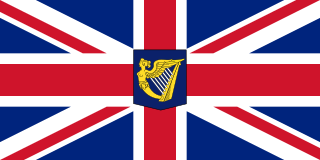
Southern Ireland was the larger of the two parts of Ireland that were created when Ireland was partitioned by the Government of Ireland Act 1920. It comprised 26 of the 32 counties of Ireland or about five-sixths of the area of the island, whilst the remaining six counties in the northeast of the island formed Northern Ireland. Southern Ireland included County Donegal, despite it being the largest county in Ulster and the most northerly county in all of Ireland.
Home rule is government of a colony, dependent country, or region by its own citizens. It is thus the power of a constituent part of a state to exercise such of the state's powers of governance within its own administrative area that have been decentralized to it by the central government.
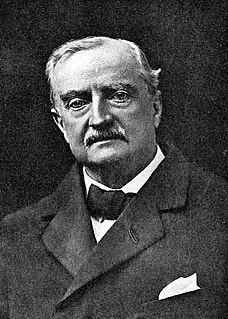
John Edward Redmond was an Irish nationalist politician, barrister, and MP in the British House of Commons. He was best known as leader of the moderate Irish Parliamentary Party (IPP) from 1900 until his death in 1918. He was also leader of the paramilitary organisation the Irish National Volunteers (INV).

The administrative geography of the United Kingdom is complex, multi-layered and non-uniform. The United Kingdom, a sovereign state to the northwest of continental Europe, consists of England, Northern Ireland, Scotland and Wales. For local government in the United Kingdom, England, Northern Ireland, Scotland and Wales each have their own system of administrative and geographic demarcation. Consequently, there is "no common stratum of administrative unit encompassing the United Kingdom".
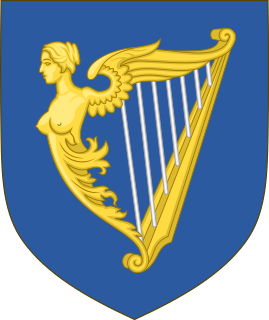
The Irish Parliamentary Party was formed in 1874 by Isaac Butt, the leader of the Nationalist Party, replacing the Home Rule League, as official parliamentary party for Irish nationalist Members of Parliament (MPs) elected to the House of Commons at Westminster within the United Kingdom of Great Britain and Ireland up until 1918. Its central objectives were legislative independence for Ireland and land reform. Its constitutional movement was instrumental in laying the groundwork for Irish self-government through three Irish Home Rule bills.
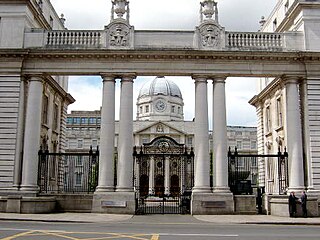
The Parliament of Southern Ireland was a Home Rule legislature established by the British Government during the Irish War of Independence under the Government of Ireland Act 1920. It was designed to legislate for Southern Ireland, a political entity which was created by the British Government to solve the issue of rising Irish nationalism and the issue of partitionism, whilst retaining the whole of Ireland as part of the United Kingdom.

The Home Rule League (1873–1882), sometimes called the Home Rule Party, was an Irish political party which campaigned for home rule for Ireland within the United Kingdom of Great Britain and Ireland, until it was replaced by the Irish Parliamentary Party. The Home Rule Confederation of Great Britain was a sister organisation in Great Britain.

The Government of Ireland Bill 1886, commonly known as the First Home Rule Bill, was the first major attempt made by a British government to enact a law creating home rule for part of the United Kingdom of Great Britain and Ireland. It was introduced on 8 April 1886 by Liberal Prime Minister William Gladstone to create a devolved assembly for Ireland which would govern Ireland in specified areas. The Irish Parliamentary Party under Charles Stewart Parnell had been campaigning for home rule for Ireland since the 1870s.

The Government of Ireland Act 1914, also known as the Home Rule Act, and before enactment as the Third Home Rule Bill, was an Act passed by the Parliament of the United Kingdom intended to provide home rule for Ireland. It was the third such bill introduced by a Liberal government during a 28-year period in response to agitation for Irish Home Rule.

Ireland was part of the United Kingdom of Great Britain and Ireland from 1801 to 1922. For almost all of this period, the island was governed by the UK Parliament in London through its Dublin Castle administration in Ireland. Ireland underwent considerable difficulties in the 19th century, especially the Great Famine of the 1840s which started a population decline that continued for almost a century. The late 19th and early 20th centuries saw a vigorous campaign for Irish Home Rule. While legislation enabling Irish Home Rule was eventually passed, militant and armed opposition from Irish unionists, particularly in Ulster, opposed it. Proclamation was shelved for the duration following the outbreak of World War I. By 1918, however, moderate Irish nationalism had been eclipsed by militant republican separatism. In 1919, war broke out between republican separatists and British Government forces. Subsequent negotiations between Sinn Féin, the major Irish party, and the UK government led to the signing of the Anglo-Irish Treaty, which resulted in five-sixths of Ireland seceding from the United Kingdom.
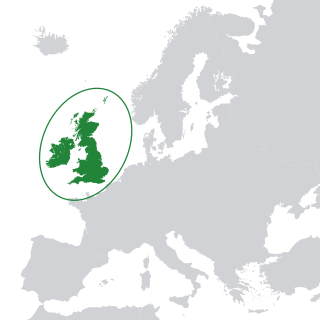
The terminology of the British Isles refers to the words and phrases that are used to describe the geographical and political areas of the islands of Great Britain, Ireland and the smaller islands which surround them. The terms are often a source of confusion, partly owing to the similarity between some of the actual words used but also because they are often used loosely. Many of the words carry geographical and political connotations which are affected by the history of the islands.

The partition of Ireland was the process by which the Government of the (then) United Kingdom of Great Britain and Ireland divided the island of Ireland into two separate polities. It took place on 3 May 1921 under the Government of Ireland Act 1920. The smaller of the two, Northern Ireland, was duly created with a devolved administration and forms part of the United Kingdom today, but the larger one, intended as a home rule jurisdiction to be known as Southern Ireland, failed to gain acceptance. The territory instead became independent and is now a sovereign state also named Ireland and additionally described as the Republic of Ireland.
In law, coming into force or entry into force is the process by which legislation, regulations, treaties and other legal instruments come to have legal force and effect. The term is closely related to the date of this transition. The point at which such instrument comes into effect may be set out in the instrument itself, or after the lapse of a certain period, or upon the happening of a certain event, such as a proclamation or an objective event, such as the birth, marriage, reaching a particular age or death of a certain person. On rare occasions, the effective date of a law may be backdated to a date before the enactment.
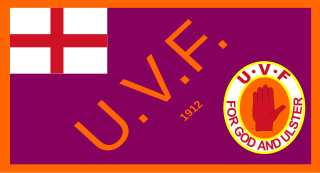
The Ulster Volunteers was a unionist militia founded in 1912 to block domestic self-government for Ireland, which was then part of the United Kingdom. The Ulster Volunteers were based in the northern province of Ulster. Many Ulster Protestants feared being governed by a Catholic-majority parliament in Dublin and losing their local governance and strong links with Great Britain. In 1913, the militias were organised into the Ulster Volunteer Force (UVF) and vowed to resist any attempts by the British Government to impose Home Rule on Ulster. Later that year, Irish nationalists formed a rival militia, the Irish Volunteers, to safeguard Home Rule. In April 1914, the UVF smuggled 25,000 rifles into Ulster. The Home Rule Crisis was halted by the outbreak of World War I in August 1914. Many UVF members enlisted with the British Army's 36th (Ulster) Division and went to fight on the Western Front.

The Buckingham Palace Conference, sometimes referred to as the Buckingham Palace Conference on Ireland, was a conference called in Buckingham Palace in 1914 by King George V to which the leaders of Irish Nationalism and Irish Unionism were invited to discuss plans to introduce Home Rule to Ireland and avert a feared civil war on the issue. The King's initiative brought the leaders of Nationalism and Unionism together for the first time in a conference.

The Irish Home Rule movement was a movement that campaigned for self-government for Ireland within the United Kingdom of Great Britain and Ireland. It was the dominant political movement of Irish nationalism from 1870 to the end of World War I.

In the United Kingdom, devolution is the Parliament of the United Kingdom statutory granting of a greater level of self-government to the Scottish Parliament, the Welsh Parliament, the Northern Ireland Assembly and the London Assembly and to their associated executive bodies the Scottish Government, the Welsh Government, the Northern Ireland Executive and in England, the Greater London Authority and combined authorities.

The revolutionary period in Irish history was the period in the 1910s and early 1920s when Irish nationalist opinion shifted from the Home Rule-supporting Irish Parliamentary Party to the republican Sinn Féin movement. There were several waves of civil unrest linked to Ulster loyalism, trade unionism, and physical force republicanism, leading to the Irish War of Independence, the creation of the Irish Free State, the Partition of Ireland, and the Irish Civil War.